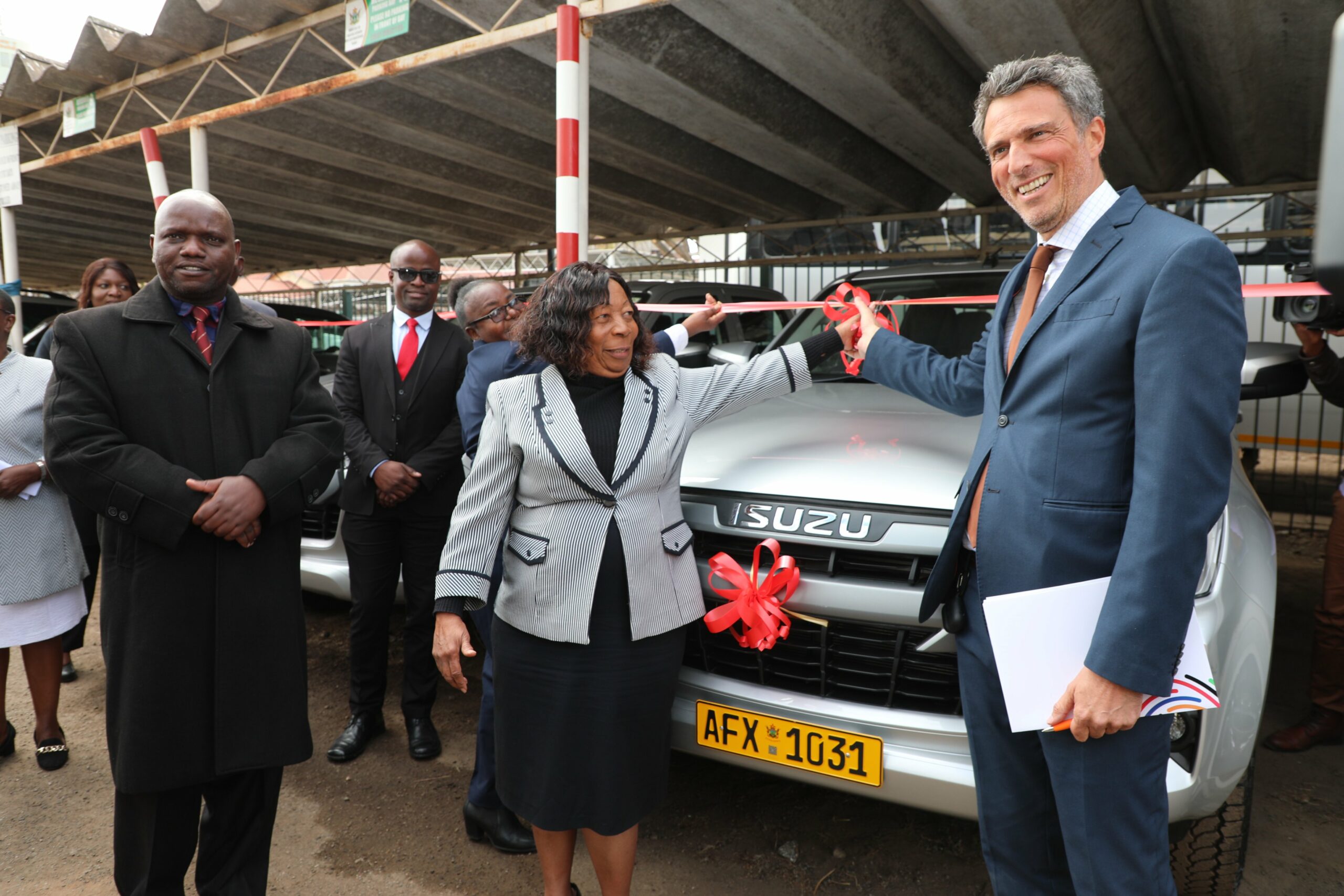|
Getting your Trinity Audio player ready…
|
Yesterday, the he European Union (EU) donated vehicles to the Government of Zimbabwe under the Technical Assistance to the Zimbabwe Economic Partnership Agreement (TAZEPA). The Acting Secretary for Foreign Affairs, Ambassador Pavelyn Tendai Musaka, received the vehicles.
The three (3), 4×4 Isuzu vehicles were purchased through the Zimbabwe Economic Partnership Agreement (ZEPA) Support project, funded by the European Union (EU), at a cost of Euro 115 026.
Ambassador Musaka said the occasion demonstrated the importance of partnerships through the availing of the necessary tools of trade for the three beneficiary institutions namely; the Foreign Affairs Ministry, the Ministry of Women Affairs, Community, Small and Medium Enterprise Development, and the National Plant Protection Office housed under the Ministry of Lands, Agriculture, Fisheries, Water and Rural Development.
“Your Excellency, allow me to extend our sincere gratitude for this gesture, which is a reflection of our continued cooperation. These vehicles we are receiving today, add to the growing list of deliverables that have been achieved through the ZEPA, which includes policy reviews and capacity building, to various Ministries and Agencies such as ZIMTRADE, the Zimbabwe Revenue Authority (ZIMRA), Competition and Tariff Commission (CTC) and National Competitive Commission (NCC) to name a few. I am also informed that there is also some ICT equipment yet to be delivered.
“The support from the EU dovetails with the Republic of Zimbabwe’s Vision 2030, “Towards a Prosperous and Empowered Upper Middle-Income Society by 2030.” The advent of the Second Republic saw a major shift towards economic diplomacy that is being championed by the President, His Excellency, Dr. E.D Mnangagwa, anchored upon the national economic blueprint, the National Development Strategy 1 (NDS1), which runs from 2021- 2025. The NDS1 aims at ensuring high, accelerated, inclusive and sustainable economic growth as well as socio-economic transformation and development as we move towards an upper middle-income society by 2030,” Ambassador Musaka said.
In order to give impetus to this Strategy, the blueprint intentionally commits resources towards building and capacitating key national institutions that play a key role in economic development, including trade. This is where cooperating partners like the EU, also play a critical role to bridge funding gaps that may exist, like what we have witnessed with the ZEPA.
The beneficiaries of these all-terrain vehicles include the NPPO, an institution that is critical in facilitating Zimbabwe’s exports of horticultural products to the EU. The timely support will go a long way towards strengthening the preventative and disease and or/pests monitoring roles of the NPPO. The horticulture sector, for example, contributes about 6,5% to the agricultural Gross Domestic Product in Zimbabwe, earning the country US$131 million in 2022.
“Our major markets remain the EU, with the Netherlands (US$25.6 million), Spain (US$6.5 million), and Germany (US$6.4 million), being the major importers. She urged the NPPO to put to good use the vehicle so that Zimbabwe’s products will be able to meet EU market requirements.”
She added that the SME sector plays an important role in developing economies. According to the 2022 Finscope SME survey, micro, small, and medium enterprises contributed US$8,2 billion to the national Gross Domestic Product and provide a living for so many people. The support to the Ministry of Women Affairs, Community, Small, and Medium Enterprise Development will go a long way towards the Ministry fulfilling its vision of attaining “Socially and economically empowered women and resilient communities enjoying gender equality in a small and medium enterprises-driven economy by 2030.”
“It is our hope that the existing cooperation continues to grow. We note the EU’s Global Gateway Initiative whose purpose is to, “Promote green, democratic and secure economic development and partnership.” We hope this initiative as a means of availing much-needed funding in our economies will not exclude sectors such as SMEs. In conclusion, once again, we express our great appreciation to the EU for this assistance. The road to economic development is easier with such supportive partners.”
